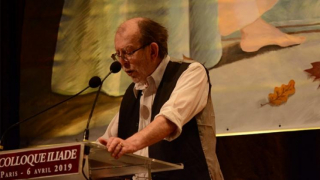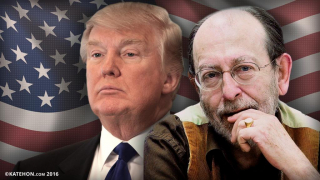Alain de Benoist: Liberalism puts liberty in the service of the individual alone
Alain de Benoist is a writer and journalist. A theorist of the “Nouvelle Droite,” he participated in the foundation of the magazines Éléments, Nouvelle École and Krisis. The critique of modernity, of ethnocentrism, as well as the defense of local autonomies are at the heart of his prolific body of work (more than 100 books and 2000 articles published). He just published Contre le libéralisme with éditions du Rocher, in which he returns to the philosophical implications of the liberal ideology that has dominated our society for two centuries.
PHILITT: You affirm that economic liberalism and political (or philosophical) liberalism overlap, but you set aside liberal thinkers that do not give the economic question a central place, like Aron or Tocqueville. In your introduction, you say that “the label of 'liberal' doesn't suffice to define them.” Nevertheless, they belong to a certain liberal tradition. Does the anti-totalitarian liberalism of an Aron and the critique of the tyranny of the majority by Tocqueville undermine the thesis of liberalism's unity defended by Jean-Claude Michéa?
Alain de Benoist: Jean-Claude Michéa never pretended that all forms of liberalism are one and the same thing. If that was the case, the diversity and multiplicity of liberalisms would become impossible to understand. On the other hand, he believes, and correctly in my opinion, that these diverse forms have essential common points, starting with the same conception of man. I explain in my book that liberal anthropology is based on individualism and economism, and I advance arguments for that. It turns out that neither Raymond Aron nor Tocqueville accord a central place to economism or even to individualism (in the sense of the individual not directly social, devoid of his belonging, entirely self owning and permanently seeking his best interest). Instead of concluding, starting from these two borderline cases, that liberalism is not intrinsically linked to the anthropology I just mentioned, it seems more reasonable to me to conclude, conversely, that these two authors only belong to liberalism strictly speaking in a very marginal fashion (we could also say that about Pierre Manent).
Furthermore, many works devoted to Tocqueville present him as a conservative before all (cf. also Bruce J. Smith, Politics and Remembrance, Princeton University Press, 2017, which likens Tocqueville to “republicans” like Machiavelli and Burke). As for Aron, we know the influence that the German philosophy of history and the great sociological tradition (Weber, Simmel, Tönnies) exercised on him. I add that you don't evidently need to be liberal in order to critique totalitarianism nor even to question the “tyranny of the majority.”
PHILITT: John Rawls, a liberal thinker of prime importance little known in France, that you mention at length in your book, defined his “theory of justice” against utilitarianism. We cannot reduce his philosophy to economism. Are we also in the presence of a liberal who would force us to refine the thesis of liberalism's unity here?
Alain de Benoist: The critique that John Rawls made of utilitarianism has nothing surprising and certainly doesn't prompt us to “refine the thesis of liberalism's unity.” The axiomatic principle of interest is actually something quite different than what is expounded by utilitarianism, for example, in the thought of Jeremy Bentham. Far from justifying selfishness, in the fashion of the liberals, on the contrary Bentham sought to give a rational foundation to altruism. According to him, the rational moral duty consists of giving the maximal utility to all, this utility understood as what diminishes pain and increases pleasure. The heart of his system is contained in this phrase: “the greatest happiness of the greatest number.” He deduces that we can sacrifice a small number of men if this sacrifice allows a larger number of individuals to maximize their interests by increasing their “quantity of pleasure.”
This affirmation squarely contradicts the liberal theory of human rights, according to which nothing justifies the obstruction, suppression, or diminishment of an individual's liberty, even to increase the liberty of a greater number. Bentham also believes that natural rights quite simply do not exist: “Where there are no laws, there are no rights.” Furthermore, he bases democracy on the idea of an absolute sovereignty of majorities, which brings him closer to Rousseau, but completely distances him from the liberals.
PHILITT: You distinguish “liberal liberty”, which you actively criticize, from liberty itself which you are a partisan of. Can you develop this distinction?
Alain de Benoist: Liberalism is not the ideology of liberty, but the ideology that puts liberty in the service of the individual alone. The only liberty that liberalism proclaims is individual liberty, conceived as liberation from anything that exceeds the individual. The principle of equal liberty also bases itself on the primacy of the individual, in the measure where he is no longer considered as a political and social being, but as an atom that is not intrinsically linked to anyone else by nature. This liberal liberty presents itself in an abstract manner, independently of any belonging or historical anchorage.
Very fortunately, liberal liberty is not the only possible fashion of conceiving liberty. We already know, from Benjamin Constant, what contrasts the liberty of the Ancients, understood as the ability to participate in public life, and the liberty of the Moderns, defined as the right to free one's self from public life. Another manner of understanding liberty is the republican or neo-republican manner, this term designates here the political tradition that extends from Titus Livy and Machiavelli (Discourses on the First Decade of Titus Livy) to James Harrington (Oceana, 1656), concluding with authors like Quentin Skinner and John Pocock. If, for the liberals, liberty is defined as what escapes any interference capable of hindering individual choices, for the republicans liberty is defined as “non-domination” and never restricts itself, in principle, to the individual sphere: I cannot be free if the political community to which I belong is not. This conception, which conceives society as a field of forces whose course is never given in advance, evidently implies the primacy of the political, the only thing capable of imposing itself and guaranteeing the liberty of a people or country. Republican liberty is concerned with society as such, while liberal liberty stunningly ignores it.
PHILITT: You affirm the equivalence of three terms: bourgeoisie, capitalism, and modernity. Nevertheless, many modern phenomena exist that are neither bourgeois nor capitalist (communism). Likewise, there exist capitalist phenomena that predate modernity (Sombart saw in the economic development of Florence in the 13thcentury an early form of capitalism). But could you say that everything depends on where we situate the birth of modernity?
Alain de Benoist: Of course there are many modern phenomena that are neither bourgeois nor capitalist! Michéa himself said regarding liberalism that it represents “the most coherent form of the modern project, but not its exclusive form.” That' why I do not affirm the equivalence of these three terms, but their concomitance: modernity, born in part from the rise of values belonging to the bourgeois class (starting with individualism, which lead to the disaggregation of natural solidarities, and the obsession with mercantile, calculable, and countable value), furnished a natural framework for the expansion of capitalism. That doesn't mean that capitalism doesn't have older roots, among which we can indeed cite the examples furnished by Werner Sombart.
It was indeed in Florence, at the start of the 13thcentury, that we find the first traces of double entry accounting, whose generalization, associated with the rise of banking, marks a commercial revolution that Sombart didn't hesitate to view as modern capitalism's birth certificate (and it's also in Florence that bimetallism appeared, expressing the price of gold in silver). We could also cite the Treatise on Money(1358) by Nicolas Oresme, the bishop of Lisieux and tutor of Charles V, which already argued for a currency finding its sole basis in the intersubjectivity of agents. But these are only roots, that economic history and the history of ideas can discover. Modernity itself didn't fall from the sky. It progressively appeared due to prior evolutions until the moment where it took its complete form. Likewise with capitalism, which didn't didn't arise ex nihilo, but didn't really unfold in full force until the 18thand especially 19thcentury.
PHILITT: Marxism and fascism constructed themselves ideologically against the liberal bourgeoisie. Nevertheless, you explain that these two political theories couldn't reach the conclusion of their reasoning: Marxism was trapped by its economism, fascism used the bourgeoisie by radicalizing its conservativism. Have you identified a political ideology that is opposed to the bourgeoisie in a coherent manner?
Alain de Benoist: From Proudhon and Sorel to Illich, Christopher Lasch, Michéa, Baudrillard, Michel Freytag or Serge Latouche, passing through Sombart, Edouard Berth, Charles Péguy, Georges Valois, Jacques Ellul, Karl Polanyi, Georges Bernanos and many others, there is no lack of thinkers from whom we could formulate a political ideology rigorously opposed to bourgeois liberalism. If its hour has not yet come, it's because liberal ideology has prevailed, for various reasons, over its competitors until now. But after having reached its peak, this ideology seems to have entered into its phase of decline. Today the crisis of great breadth that strikes liberal democracies, the threat of the general depreciation of value that threatens the capitalist system, the evolution of opinion, which hardly believes in progress any more and begins to realize that “always more” doesn't necessarily mean “always better,” lets us predict revolutions to come.
For the moment, we can already detect localized attempts to establish different ways of life in enclaves “liberated” from the dominant ideology. These attempts are unequal in value, but could announce harvests that have begun to sprout. Today we're passing through a phase of historic transition. We're seeing a world that we've known disappear, sometimes loved (or not), while the contours of the world ahead only begins to take shape. The world has lived for centuries, even millennia, without liberal capitalism. I'm convinced that it could live again without it. History is open.
PHILITT: Strictly speaking, can we seriously consider the Yellow Vests' Movement as an anti-liberal and anti-bourgeois movement? Is the “revolutionary” dimension of the movement condemned by its vision of things (increase of salaries, quality of life, the price of gas, etc)? Does not liberating oneself from liberalism imply radically changing one's vision of the world (renouncing economism, materialism, individualism)?
Alain de Benoist: We must take the Yellow Vests' Movement for what it is: a rough phenomenon, a spontaneous movement that no one saw coming, while everything predicted it.

Photo - Wikipedia
In order to describe it, I would use the expression of “the populism of the people” (Vincent Coussedière), this populism that doesn't identify itself with any political movement and that organizes itself outside of the unions. It's the party of those who have no party, the party of the victims of globalization, of those who have been victims of a triple political, social, and cultural exclusion for years, of those that we've ignored, humiliated, made invisible, who take the stage so that we recognize their existence. An anti-liberal and anti-bourgeois movement? Doubtlessly not consciously, but how could the popular classes and the middle classes in the process of decline, who are still bearers of “common decency” and know that “there are things that should not be done”, feel solidarity with a liberal bourgeoisie that ceaselessly displays a real class contempt for them?
The Yellow Vests' Movement has certainly been the carrier of “economic” demands from the start, but very quickly they gave way to more urgent demands (“Macron, resign!”, the people's referendum initiative). To reduce it to a pure demand for increased purchasing power, to a simple “social movement” as we've known, would be a serious error. In the past, many revolts started with simple fiscal grievances, before transforming into movements with unexpected extents. Let's remember the Boston Tea Party in 1773, which announced the war of American independence! You're certainly right to say that we must radically change our vision of the world in order to liberate ourselves from liberalism. But we will not reproach the Yellow Vests for not having read Nietzsche, Louis Dumont, or Baudrillard! Their movement is a tremendous symptom. The same causes always producing the same effects, maybe we must say: a general repetition.
Translation - Eugen Monsalvat






